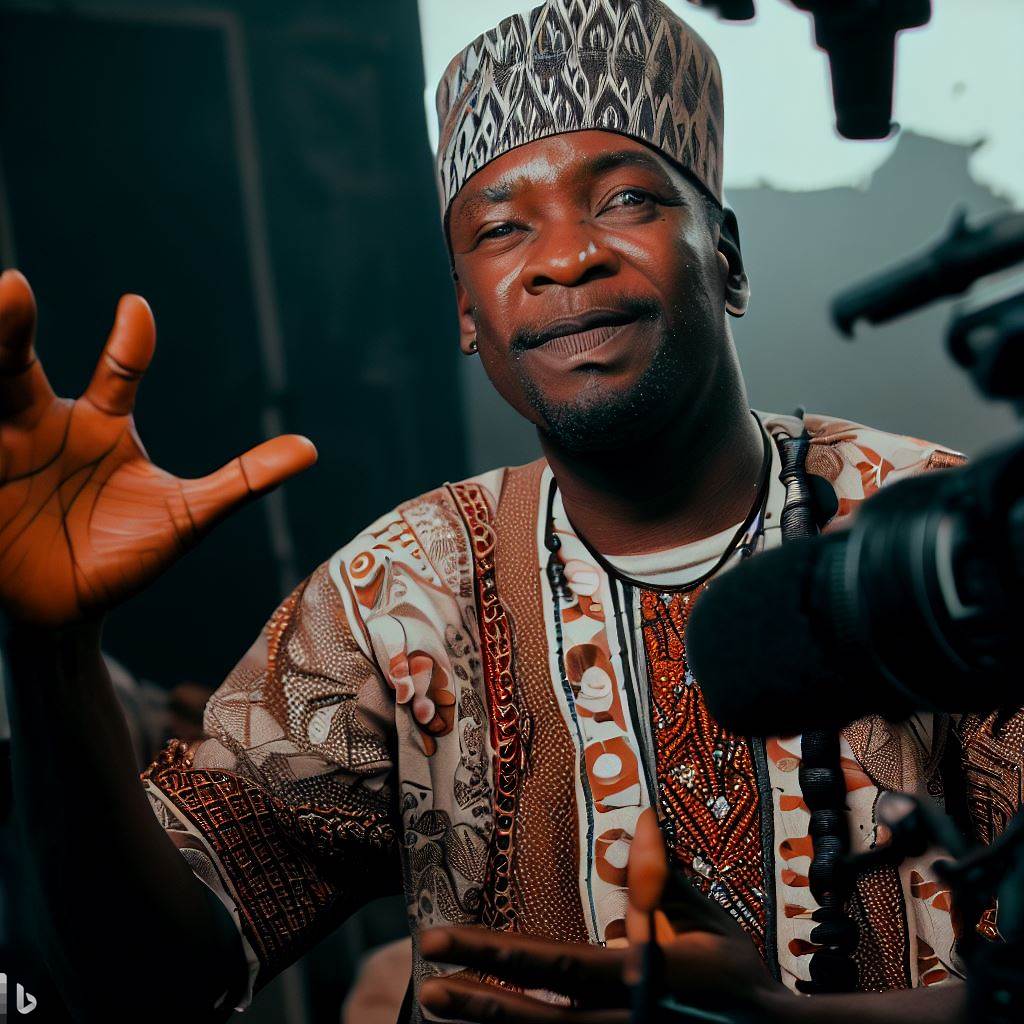Introduction
Nigeria has a rich and diverse music industry, with a long history of music production.
This blog post aims to explore the rise and evolution of music production in Nigeria, highlighting its importance and impact on the country’s music scene.
Through this post, we will delve into the various factors that have contributed to the growth of music production in Nigeria, such as technological advancements and the emergence of talented music producers.
Additionally, we will examine the influence of different genres and regional styles on the production process, showcasing how Nigeria’s music production has evolved over time.
Overall, this blog post seeks to shed light on the significance of music production in Nigeria and its role in shaping the vibrant music culture of the country.
Historical Background of Music Production in Nigeria
Early years of music production in Nigeria
Early years of music production in Nigeria were heavily influenced by traditional Nigerian music, which played a crucial role in shaping the industry.
Nigerian composers and producers emerged as key figures in the music scene, driving the evolution and popularity of Nigerian music.
Traditional Nigerian music, with its rich history and diverse cultural heritage, formed the foundation for music production in the country.
The traditional styles and rhythms of various ethnic groups provided the inspiration for early Nigerian composers and producers.
These composers and producers, passionate about preserving and promoting Nigerian music, worked tirelessly to create a thriving local music industry.
They combined traditional elements with modern influences to develop a uniquely Nigerian sound that resonated with audiences.
The rise of Western influence on music production in Nigeria
The early years also saw the rise of Western influence on Nigerian music production. With the arrival of colonization, Western music began to permeate Nigerian society.
This colonization had a profound impact on Nigerian music, as it introduced new musical instruments, techniques, and genres.
The fusion of traditional Nigerian music with Western influences created a vibrant and diverse music scene in Nigeria.
Nigerian composers and producers embraced these new influences, incorporating them into their compositions and productions.
The introduction of recording technologies further revolutionized music production in Nigeria. Prior to the introduction of recording technologies, music was primarily performed live.
However, with the advent of recording equipment, musicians were able to capture their performances and distribute their music to a larger audience.
This innovation opened up new opportunities for Nigerian artists, allowing them to reach a wider audience and export their music internationally.
The availability of recorded music also enabled the growth of the music industry, as record labels and distribution networks were established to meet the increasing demand for Nigerian music.
In the end, the early years of music production in Nigeria were shaped by the influence of traditional Nigerian music and the efforts of Nigerian composers and producers.
The rise of Western influence, due to colonization and the introduction of recording technologies, further transformed the Nigerian music scene.
These factors laid the foundation for the evolution of music production in Nigeria and set the stage for the global recognition and success that Nigerian music enjoys today.
Read: Education and Training for Music Producers in Nigeria
The Golden Era of Nigerian Music Production
The Emergence of Highlife Music
Highlife music, characterized by its lively rhythms and fusion of African and Western influences, gained prominence.
Notable characteristics of highlife music include the use of guitars, horns, and a vibrant danceable rhythm.
Highlife music was pioneered by musicians and producers such as E.T. Mensah, Bobby Benson, and Victor Olaiya.
Highlife music, with its lively rhythms and fusion of African and Western influences, became a popular genre in Nigeria.
It was characterized by the use of guitars, horns, and a vibrant danceable rhythm. Pioneers of highlife music such as E.T. Mensah, Bobby Benson, and Victor Olaiya contributed to its development and popularity.
During this period, record labels played a crucial role in promoting Nigerian music.
Labels like Decca and Philips-West African Records signed and recorded highlife musicians, exposing their music to a wider audience.
These labels played a significant part in spreading the popularity of highlife music across the country.
Growth of Record Labels and Studios in Nigeria
Record labels like Decca and Philips-West African Records played a significant role in promoting Nigerian music.
These labels signed and recorded highlife musicians, helping to spread the genre’s popularity across the country.
Local record labels and production studios, such as West African Rhythm Brothers and HMV Nigeria, emerged.
These establishments provided platforms for Nigerian artists to record and distribute their music on a larger scale.
In the 1950s and 1960s, Nigeria experienced a golden era of music production, marked by the emergence of highlife music and the growth of record labels and studios.
Local record labels and production studios also began to emerge during this era.
West African Rhythm Brothers and HMV Nigeria were among the establishments that provided platforms for Nigerian artists to record and distribute their music on a larger scale.
This growth of local labels and studios contributed to the flourishing music industry in Nigeria.
Decca and Philips-West African Records were influential in the Nigerian music scene. They created opportunities for Nigerian artists and helped shape the sound of Nigerian music during this era.
These labels not only signed highlife musicians but also recorded a variety of other genres, showcasing the diversity of Nigerian music.
The establishment of local record labels and production studios further strengthened the music industry in Nigeria.
Artists now had more opportunities to showcase their talent and reach a wider audience.
This period marked the beginning of a thriving music scene that would continue to evolve and shape Nigerian music production.
In fact, the golden era of Nigerian music production saw the emergence of highlife music and the growth of record labels and studios.
Highlife music, with its distinctive characteristics, became popular, thanks to pioneers like E.T. Mensah and Victor Olaiya.
Record labels like Decca and Philips-West African Records played a crucial role in promoting Nigerian music, while local labels and studios provided platforms for Nigerian artists to showcase their talent.
This era laid the foundation for the vibrant and diverse music industry that Nigeria has today.
Read: Traditional Elements in Modern Nigerian Music Production
Evolution of Music Production Techniques
The influence of Afrobeat and juju music on production techniques
Afrobeat and juju music have significantly influenced the evolution of music production techniques in Nigeria.
These genres have played a crucial role in shaping the way Nigerian music is produced and have contributed to its distinct sound.
One of the main aspects influenced by Afrobeat and juju music is the use of complex instrumentation and arrangement.
Both genres feature a wide range of musical instruments, creating intricate and layered compositions. This complexity adds depth and richness to the music, making it more engaging for the listeners.
Moreover, technology has played a vital role in enhancing the production quality of Afrobeat and juju music.
With advancements in music production software and equipment, producers have been able to experiment with different sounds and effects.
This has allowed them to create unique and innovative productions that push the boundaries of traditional Nigerian music.
The impact of globalization on Nigerian music production
Globalization has also had a significant impact on Nigerian music production. With the rise of the internet and social media, Nigerian music has reached a global audience.
This has led to the incorporation of international production trends into Nigerian music. Producers now aim to create music that appeals not only to the local audience but also to listeners from around the world.
In line with this, the use of digital audio workstations (DAWs) and software plugins has become increasingly prevalent in Nigerian music production.
DAWs allow producers to record, edit, and mix music in a digital format, offering more flexibility and control over the production process.
Additionally, software plugins provide access to a wide range of virtual instruments and effects, expanding the creative possibilities for producers.
This integration of technology and globalization has led to the growth and diversification of Nigerian music production.
Producers now have access to a vast array of tools and resources that enable them to experiment and push the boundaries of traditional Nigerian music.
In essence, Afrobeat and juju music have influenced Nigerian music production techniques through the use of complex instrumentation and arrangement.
Additionally, technology has played a vital role in enhancing production quality.
Globalization has also contributed to the evolution of Nigerian music production, with the incorporation of international trends and the use of digital audio workstations and software plugins.
These factors have propelled Nigerian music onto the global stage, giving it a unique and distinct sound that continues to evolve in today’s music industry.
Read: Making Beats: Software Choices of Top Nigerian Producers

Contemporary Music Production in Nigeria
The Role of Nigerian Music Producers in the Global Music Industry
- Nigerian music producers have played a significant role in shaping the global music industry.
- They have collaborated with numerous international artists, leading to the fusion of different sounds.
These collaborations have not only helped put Nigerian music on the international map but have also contributed to the diversification of musical styles worldwide.
- One notable collaboration is the partnership between Nigerian producer, Sarz, and American artist, WizKid, on the hit song “Come Closer”.
- This collaboration showcased the Nigerian sound and introduced it to a wider audience.
Furthermore, Nigerian music producers have received Grammy nominations and international recognition for their outstanding production skills.
- Grammy-winning producer, Burna Boy’s album “Twice as Tall” was produced by Nigerian producer, LeriQ.
- This achievement highlighted the immense talent and creativity of Nigerian producers on a global scale.
The Influence of Different Music Genres on Production in Nigeria
Nigeria, known for its vibrant music scene, draws inspiration from various music genres, resulting in a rich and diverse production landscape.
- Afrobeat and Afrobeats have become widespread genres that have influenced music production in Nigeria and beyond.
- The unique blend of traditional Nigerian rhythms, highlife, and jazz elements characterizes Afrobeat.
Afrobeats, on the other hand, evolved from Afrobeat, incorporating elements of hip-hop, dancehall, and reggae.
- One cannot deny the widespread popularity of Afrobeat, with artists like Fela Kuti and Burna Boy paving the way.
- It has gained international recognition, with artists like Beyoncé and Drake incorporating Afrobeat sounds into their music.
Additionally, Nigerian music producers have successfully fused Nigerian music with other genres, creating unique and innovative sounds.
- For instance, WizKid collaborated with Canadian rapper, Drake, on the global hit “One Dance”, which combined Afrobeats with elements of dancehall and pop.
- This fusion showcased the versatility of Nigerian music and its ability to cross cultural boundaries.
In review, Nigerian music producers have played a crucial role in pushing the boundaries of music production globally.
Their collaborations with international artists and the fusion of different music genres have not only expanded the reach of Nigerian music but have also contributed to the evolution of the global music industry.
Nigerian producers have proven their talent and creativity, earning Grammy nominations and international recognition.
Furthermore, the popularity of genres like Afrobeat and the fusion of Nigerian music with other styles have showcased the diversity and uniqueness of Nigerian music production.
Read: Music Producers and Talent Scouting in Nigeria: A Close Look
Future Outlook of Music Production in Nigeria
Potential growth and expansion of the Nigerian music industry
- The Nigerian music industry is experiencing a surge in growth and expansion.
- The rising number of music production schools and programs is contributing to this growth.
- These institutions equip aspiring artists and producers with the necessary skills and knowledge.
- As a result, more talent is being nurtured and entering the industry.
- This influx of talent creates opportunities for innovation and fresh perspectives in music production.
- The industry’s expansion also leads to job creation, benefitting the Nigerian economy.
- Investors and stakeholders recognize the immense potential and profitability of the music industry.
- With the right resources and support, the Nigerian music industry can flourish even further.
- Government and private sector involvement is crucial for sustained growth and development.
- This expansion opens doors for international collaborations and partnerships, promoting Nigerian music on a global scale.
Challenges and opportunities in the industry
- Piracy and copyright infringement pose significant challenges to the Nigerian music industry.
- Efforts need to be made to combat piracy and protect the intellectual property of artists.
- Strict enforcement of copyright laws and punitive measures for infringers are necessary.
- Collaborations between the government, artists, and production companies can help address the issue.
- Investing in infrastructure and technology is a critical opportunity for the Nigerian music industry.
- State-of-the-art recording studios, equipment, and production software can enhance the quality of music produced.
- Improved infrastructure, such as reliable power supply, can facilitate uninterrupted music production.
- Developing efficient distribution channels will enable artists to reach a wider audience and generate more revenue.
- Creating platforms that encourage collaborations between local and international artists will boost the industry.
- International partnerships can expose Nigerian artists to new markets and provide opportunities for growth.
- The Nigerian music industry should leverage social media platforms and streaming services for promotion.
- Engaging with fans through online marketing and building a strong online presence is crucial for success.
In general, the future outlook for music production in Nigeria is promising.
The industry’s growth and expansion can be ensured through the establishment of more music production schools and programs and investment in infrastructure and technology.
However, challenges such as piracy and copyright infringement need to be addressed. Collaborations and international partnerships provide opportunities for further growth.
By embracing the potential of digital platforms and focusing on innovation, the Nigerian music industry can continue to thrive both locally and globally.
Gain More Insights: The Evolving Soundscape of Nigeria: A DJ’s Perspective
Conclusion
Throughout this blog chapter, we delved into the intriguing journey of music production in Nigeria.
We explored how the industry has experienced significant growth and transformation over the years, from its humble beginnings to its current position as a major player in the global music scene.
Also, we discussed the influence of various genres on Nigerian music production, such as Afrobeat, which originated in Nigeria and has gained popularity worldwide.
We also highlighted the role of legendary Nigerian artists and producers in shaping the music industry and inspiring future generations.
Publish Your Professional Profile, Business or Brand
Showcase your expertise, gain trust, and boost visibility instantly on Professions.ng.
Publish NowFurthermore, we examined the technological advancements that have revolutionized music production in Nigeria.
The accessibility of digital technology and the widespread adoption of home recording studios have empowered aspiring musicians and producers to create music with greater ease.
Moreover, we explored the impact of Nigerian music production on the global stage.
The infectious rhythms, captivating melodies, and unique cultural elements in Nigerian music have captured the attention of audiences around the world.
This global recognition has not only enhanced the reputation of Nigerian music but has also created opportunities for collaboration and cultural exchange.
The rise and evolution of music production in Nigeria have been nothing short of remarkable.
Nigerian music production has not only shaped the local music industry but has also made a significant impact on the global stage.
As we look to the future, it is evident that Nigerian music production will continue to thrive, inspiring and captivating audiences worldwide.




